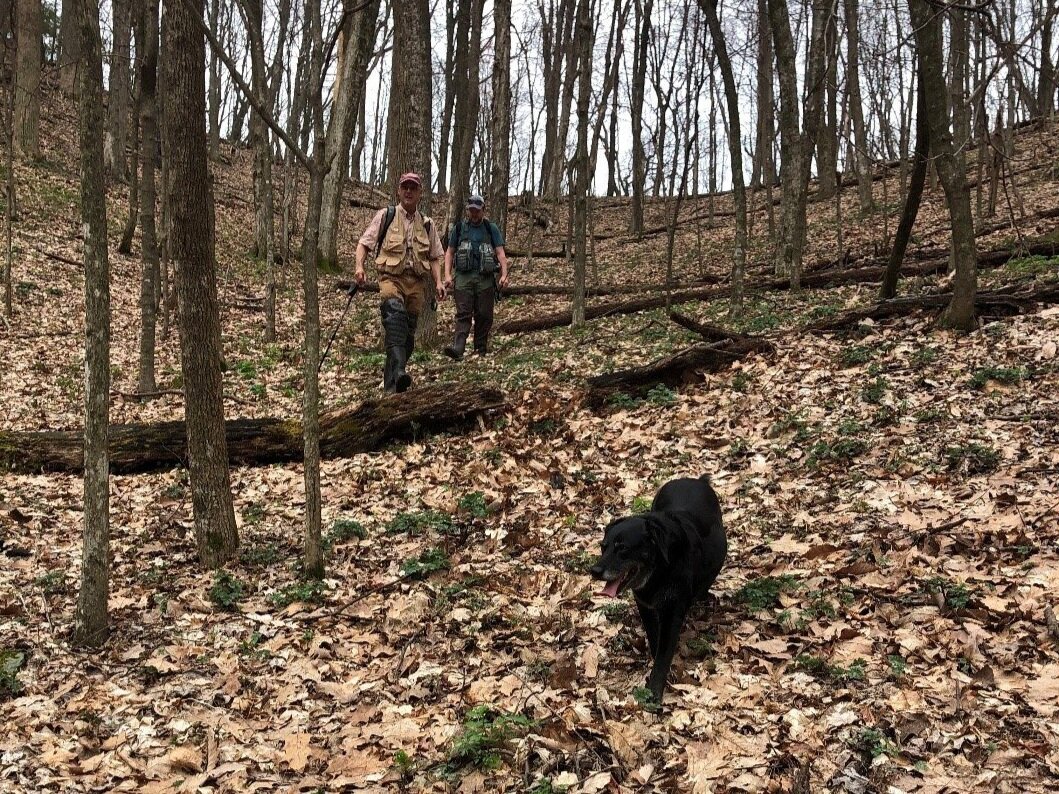By: Bennett Saunders
March 27, 2020
Marshall and a native brook trout.
The nursery boxwood dig list on Friday was very lean. Business was dead. The Coronavirus had caused the entire country to shut down. Everybody was staying at home. Even church was closed. There was nothing to do this weekend.
My 25-year-old son, Tye had asked me to go trout fishing with him. His boss had told him to stay at home in Charlotte, North Carolina, and rather than stay alone in his apartment, he had decided to come back to Piney River, Virginia. He had been home for 10 days working remotely with the WiFi in our home.
I hadn’t been trout fishing with him, seriously...ever. As a young teenager, my dad had taken me fishing to this remote native trout streams as a rite of passage. As I do the math, I absolutely cannot fathom that was 45 years ago. I had told my sons for years we should go up there fishing. But it was too far to walk. It would take a WHOLE DAY. I had other things to do. I didn’t have the time.
But now I did.
Bennett, Tye, and Sawyer on the hike into the remote fishing grounds.
Tye, in turn, invited his older brother Marshall to go with us, and it became a family affair which even included our dog, Sawyer. As we stopped to catch our breath on the rugged 2-mile hike into the remote mountain trout stream, I gave them the family history lesson.
It is difficult to imagine, but this rugged mountain land was once farmed by my great-grandfather’s family. There were piles of rocks and terraces everywhere, some old “fields” no larger than an average room in a house. They raised tobacco on these terraces in the mountains.
My great-grandfather Paulus Powell Massie, a Baptist preacher, was born and raised in these mountains. Born in 1851, he was but 10 years old when the Civil War broke out in 1861. His four older brothers went off to fight the Yankees. One was laid to rest at Gettysburg as a member of 19th Virginia Infantry in Pickett’s charge on July 3, 1863. One was wounded at the battle of Chancellorsville, recovered, but succumbed to dysentery and died in 1864. Two brothers fought vain battles for the Southern Cause for four years and were lucky enough to walk home from Appomattox.
Left to right: My great-grandfather, Rev. Paulus Powell Massie, his wife Emma, and Emma’s father David Staples Woodson (another Civil War Veteran) circa 1930. English boxwood in the background.
Family lore has it that my great-grandfather’s family raised huge tobacco crops in these mountains during the Civil War. They stored tobacco under a huge rock on the side of the mountain but didn’t sell it until after the Civil War because Confederate money was worthless. When they did sell, the brothers and their father made enough money from the crop to make a down payment on the boxwood farm that I now live on.
I thought it was tough now! It is interesting to hear of the toils of our ancestors. During their lifetime, they struggled with inferior farmland, a Civil War that took two brothers to their death, constant sickness with limited medical help, and then lean times during Reconstruction. It puts the Coronavirus into perspective. We will get through this, and we will be stronger in the end.
I have now passed this rite of passage with my sons. The mountains were brilliant, the stream spectacular, and the fishing… do we really have to catch fish? To leave civilization and the Coronavirus for a weekend was a breath of fresh air. The weekend made me remember what is important in life. It brought my family together for a memorable weekend. I am ashamed that it took 45 years and a deadly virus for me to take my boys to this sacred ground.
Beware, fish!




